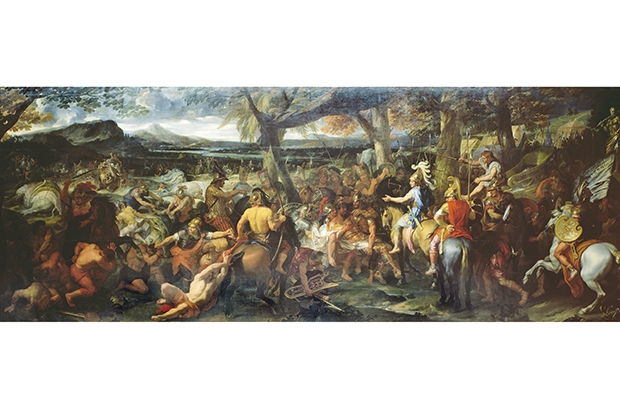Classics is a boastful subject. Even the name — classics — has an inner boast; as does the classics course at Oxford, Literae Humaniores (‘more humane letters’), and the course’s second half, Greats.
Michael Scott, a classics professor at Warwick University and a telegenic media don, tries to put an end to the boastfulness in this book. It has always understandably annoyed him that, in the field of Greek and Roman studies, book titles often include the words ‘Ancient World’ — as if there were only one ancient world, and it only included Greece and Rome.
And so he attempts an ambitious reordering of ancient worlds — thus the book’s title — and brings the study of Greece and Rome together with Central Asia, India and China. He begins with the late 6th century BC — the early years of Athenian democracy and the Roman Republic, and the Confucius era in China. Then he jumps to 218 BC, when China had its first emperor and Hannibal took on Rome. And he finishes in 312 AD, when Constantine began to convert the Roman world to Christianity, just as Buddhism was spreading through China thanks to the Silk Roads.
It is a thoroughly admirable ambition but it doesn’t really work — because it isn’t until the end of his period that there is any real overlap of the different strands Scott longs to plait together. Yes, there are a few early collisions, and Scott begins with one of the best: Megasthenes, a 3rd century BC Greek who wrote of Indian legends, linking the birth of their society to the Greek gods of the Mediterranean. Among them was Dionysus, who, according to one legend, taught the Indians to make wine, build cities and establish law. And, by the 1st century AD, Roman toffs were wearing Chinese silk, with Roman merchants sailing to southern Arabia and Tamil India.
But, for the most part, particularly in the early period in Scott’s book, East and West rarely met in any significant way. As Scott himself, too honest to push his thesis, says, ‘We believe Greece and Rome had no direct knowledge of China until after the fourth century BCE.’
Scott, then, is forced to make pretty broad generalisations about the parallels between the civilisations: that, in Greece, Rome and China, they all felt ‘a nagging sense of injustice… towards governance that was overwhelmingly autocratic’. Well, you could easily say that of countless civilisations in countless periods. There are bound to be similar phenomena across civilisations — like the regular wars that blighted Confucius’s world, as they did Greece and Rome — but coincidence doesn’t mean causation, particularly when the coincidences are separated by thousands of miles.
The differences between the civilisations are often as great as the similarities. And Scott, again, is honest enough to acknowledge that, ‘Unlike the Greeks, the Zhou [the Chinese dynasty] did not face an external enemy of the might and magnitude of the Persians.’
Because the parallels between the civilisations wax and wane, Scott is forced to do a lot of comparing and contrasting. So he accepts that Confucius is a long way from the radical democracy of Athens; but, then, unwilling to let go of the parallels, he argues that there is something democratic in Confucian teachings because his system applied equally to all people, not just rulers.
It’s certainly true that there were sudden, great intellectual leaps forward in the classical world and the East in the 5th century BC, but there is no apparent glue between them.
And so, rather than being able to show East and West shuttling smoothly in each other’s directions, Scott must make lurching gear changes between the two: ‘As Hannibal and Rome sat in stalemate and Philip [V of Macedon] succumbed to alcoholic gloom, 8,000 kilometres to the east Qin Shi Huangdi revelled in his accomplishments.’
The book ends up, then, as a good triple history of Rome, Greece and China, with quite a bit of India, too. It acts as an effective primer to, inter alia, the birth of Greek democracy, Confucius, the battles of Marathon and Salamis, Hannibal, Constantine, early Christianity and early Buddhism.
This is an impressive feat in the tightly-demarcated groves of academe, where academics tend to study individual flowers and flowerbeds, rather than leap the wall into the next-door garden.
Scott is blissfully free, too, of latinate, jargon-rich academese, even if he is keen on the polite perfect passive, acknowledging debts to other academics: ‘It has been argued that…’; ‘It has often been lamented that…’. But, in the end, Scott fails to show the global, connected ancient world he set out to describe.






Comments